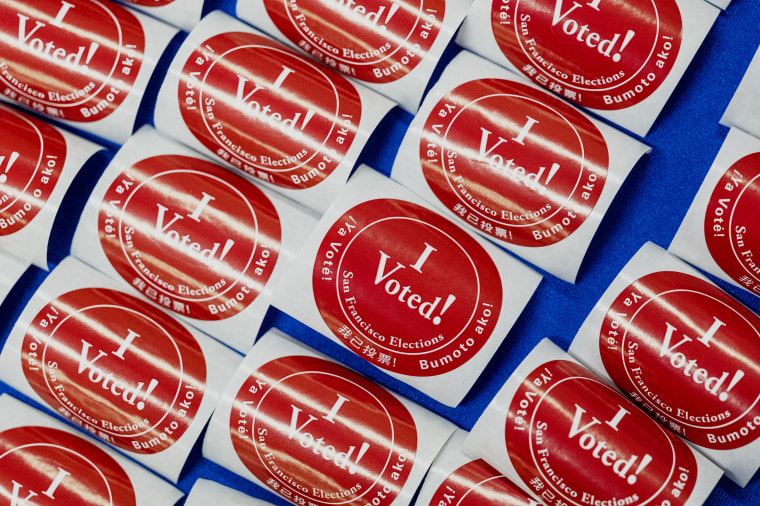San Francisco is cracking down on the long-standing practice of candidates choosing their own Chinese names to appear on the ballot as a way to appeal to Asian American voters.
Traditionally, candidates for elected office — including those who are not Chinese — have strategically selected Chinese names to convey certain personality traits, seemingly to bolster their image.
District Attorney Brooke Jenkins, for example, took the name 謝安宜, pronounced Xie An Yi in Mandarin and Ze On Ji in Cantonese, meaning “safety and pleasant” in the 2022 special election.
And in 2010, Michael Nava unsuccessfully ran for San Francisco Superior Court judge with the name 李正平, pronounced Li Zheng Ping in Mandarin, meaning “correct and fair.”
But now, the city’s Department of Elections is adopting a policy that requires candidates to submit evidence that shows an established use of a Chinese name for at least two years, according to memorandum last week from the department’s director.
“The Department understands the [Board of Supervisors’] concerns regarding potential abuses of names and transliteration,” the memorandum said.
The Department of Elections did not respond to NBC News’ request for comment.
Besides the issue of selectively boosting one’s campaign, there’s also the possibility of double dipping and a Chinese candidate feeling a sense of cultural appropriation when it comes to choosing a Chinese name.
The use of Chinese names in elections came under scrutiny in October after Democratic County Central Committee candidate Emma Heiken took the name 馬凱勤, pronounced Ma Hoi Kan in Cantonese, saying that her friends and family had given it to her. But the two characters 凱勤, the equivalent of a first name, were the same as the name of her opponent, Natalie Gee — only Gee has had the name since birth. Gee, whose full Chinese name is 朱凱勤, pronounced Zyu Hoi Kan, had demanded her opponent stop using the moniker.
She told NBC News that the name, an uncommon one, means “working hard will lead to victory.” She added that the Romanization of the characters appears as her middle name on her birth certificate and driver’s license.
“My mom spent a long time coming up with my name. She loved reading historical Chinese literature and came up with this character combination to reflect the struggles that my parents went through starting a new life in the United States and the hope and dreams they had for a better future,” Gee wrote in an email. “My name is an honor that I embrace every day and is an important part of my heritage.”
Heiken adopted the name 希儀文 — pronounced Hei E-Mehn, a phonetic translation of her name — shortly afterward.
“I had no intention or interest in going by a name already in use, and I’m glad the other candidate brought it to my attention,” Heiken said in an email.
Following the two candidates’ name clash, city Supervisor Connie Chan successfully pushed for the board to implement a statewide bill, passed in 2019, which allowed candidates with Asian birth names to use them on ballots. And those who did not have a Chinese name by birth were limited to using a phonetic translation of their given name, unless they could demonstrate that they had “been publicly known by and identified by that [Chinese] name over the past two years.”
As it stands now, the city follows its own elections code, which stipulates that candidates only need to demonstrate an “established use” of a name or transliteration, but it did not define “established.” Going forward, the city will adhere to the state bill.
Gee told NBC News that she was glad about the city’s decision to tighten Chinese name rules.
“I get that non-Chinese candidates want to connect with the Chinese community, and that is great, but they should do it genuinely rather than appropriating a Chinese name so that they appear Chinese--that comes off as deceptive,” Gee wrote. “I know non-Chinese people who have been bestowed a Chinese name by our community elders because of their long history of working in the Chinese community--in those cases, it’s an honor from the community.”
Heiken said she similarly saw the increased guidance as good news.
“This has been a long-standing practice in San Francisco without much regulation,” she said.
Across other states, candidates have also historically chosen Chinese names, and the practice has made a difference in the Asian American electorate. In 2008, New York State Senate candidate Dan Squadron was given the name Si Cot Ching from the local Sing Lin community group. And, with strong support from Chinatown voters, he defeated 30-year incumbent Sen. Martin Connor in the Democratic primary. Additionally, former New York Gov. Eliot Spitzer, who served from 2007 until his resignation the following year, was given the name Xi Bi Cha, which roughly translates to “one who thinks.”
